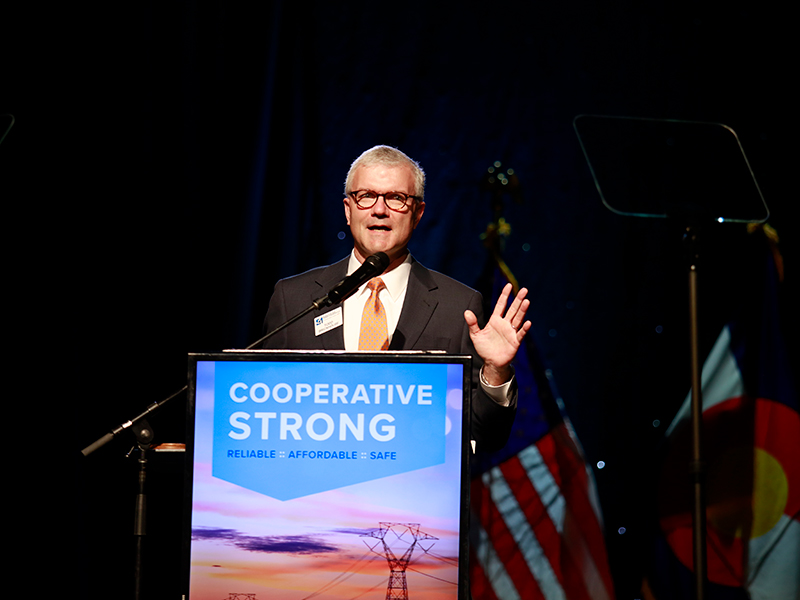Below is a summary of Todd Brickhouse's CEO and General Manager message at the 2024 Basin Electric Annual Meeting.
The theme of this year’s annual meeting is Investing for the Future. CEO and general manager Todd Brickhouse discussed how investing for the future involves uncertainty and ambiguity.
“Before uncertainty and challenges give way to frustration, I remind myself of the old sailor’s quote: ‘The pessimist complains about the wind, the optimist expects it to change, and the realist adjusts their sails accordingly.’ We strive to be realists at Basin Electric, so let me discuss some of the ways we are setting our sails accordingly,” Brickhouse said.
One example Brickhouse gave is growth.
“Last year, our unit sales volumes to members increased 7.5%, which was on top of 7.8% growth in 2022. Through June of this year our unit sales growth is a robust 6.3%. Post COVID, we recognized this acceleration in actual and projected growth, and our capital expenditure forecast for the next 10-years is now $8 billion – this amount of investing for our future will almost double our current balance sheet,” Brickhouse said.
Brickhouse went on to discuss the impacts growth may have on Basin Electric’s capital structure. He said growth presents both opportunities and risks.
“The biggest opportunity is for our members to experience higher standards of living from economic growth, which they have,” Brickhouse said. “With respect to risks, many of these loads can materialize faster than Basin can build generation, which impacts both reliability and affordability.”
He continued by discussing ways to mitigate these risks.
Brickhouse said much of the change to Basin Electric’s power supply needs is driven by the technology sector.
“Think back to the turn of the century. Google was two years old, Microsoft was selling their products on CDs, Amazon was just selling books, and Facebook did not even exist,” Brickhouse said. “Flash forward to the present, and the business models of these companies are almost exclusively focused on cloud computing. And the electrons we produce and distribute are the raw materials for these business models. Accordingly, the utility industry needs to adapt its business model to these large loads.”
Brickhouse said the utility industry has not arrived at a definitive solution, but the need for a new model is straightforward.
“My comments in this regard are in no way suggesting growth is bad or unwanted. My comments are an acknowledgement of the changing circumstances we face and the need to adapt, or ‘set our sails accordingly,’” Brickhouse said.
Brickhouse discussed the 11 major projects Basin Electric has underway with a price tag of $1.9 billion.
He continued by discussing the plans in place to address higher prices materializing.
“These actions have had favorable impacts to both our reliability and costs,” Brickhouse said.
Brickhouse said there are a number of factors constraining our efforts to ensure reliability – most notably, the EPA.
“EPA is on a determined campaign of regulatory overreach which not only threatens our existing generation assets, but also severely restricts what technologies we can use to ensure future reliability,” Brickhouse said.
Brickhouse said that, of course, Basin Electric prefers continuing its pursuit of innovation rather than EPA regulation. He shared that Basin Electric is a leader in CO2 capture and storage, discussing its investment at the Integrated Test Center at Dry Fork Station and CO2 sequestration at the co-op’s largest subsidiary, Dakota Gasification Company.
Brickhouse said if the EPA is successful with their regulatory program, it spells a less reliable and more expensive future for U.S. electric consumers.
“One way we measure our success as a G&T is the rate we charge our members. In 2023, Basin’s average rate per megawatt hour was $60, which was the 13th lowest out of the 52 G&Ts who reported to their statistics. The average rate reported by all G&Ts was $74.54,” Brickhouse said.
He said several factors are contributing to financial pressure in 2025 that necessitate a rate increase, including lower projected surplus sales in the west, and investment and expenses related to growth.
“We know this is unwelcome news… we greatly appreciate the discussions and feedback we have received related to how best to implement the rate change,” Brickhouse said.
Brickhouse closed by saying that Basin Electric is committed to “adjusting our sails” as the co-op invests in a safe, reliable, and affordable future for our member-owners.

